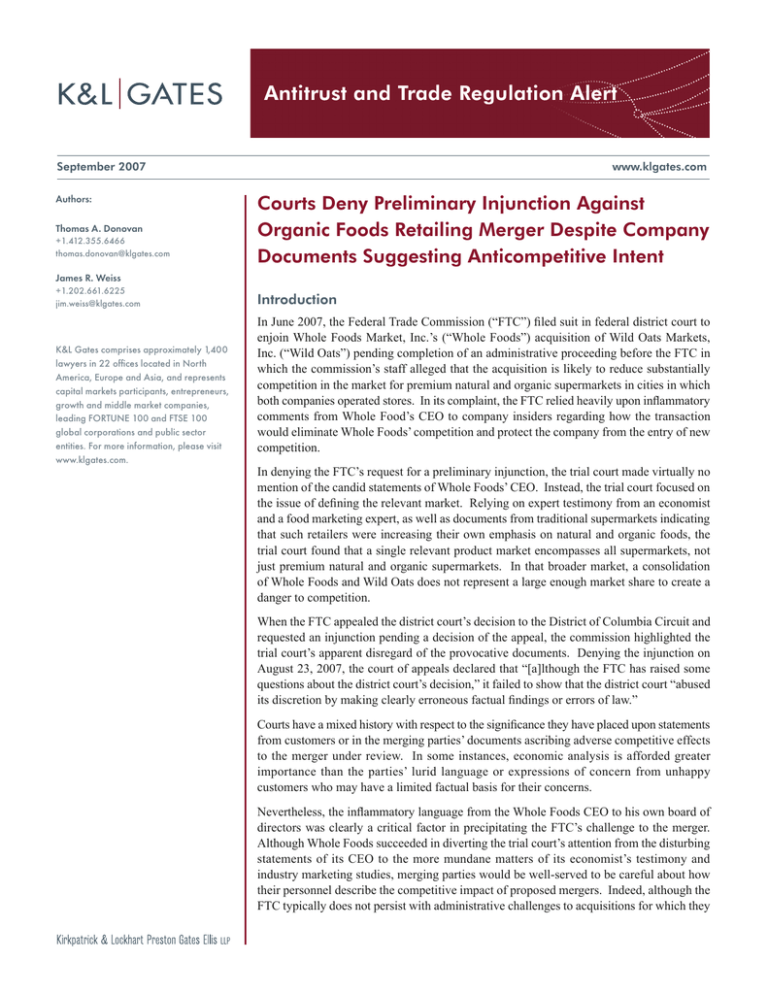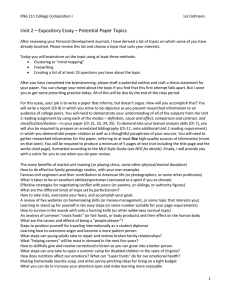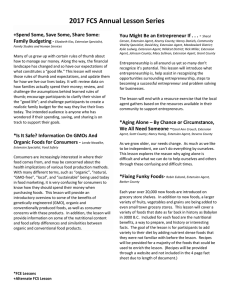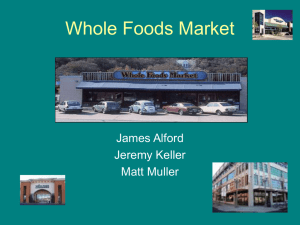
Antitrust and Trade Regulation Alert
September 2007
Authors:
Thomas A. Donovan
+1.412.355.6466
thomas.donovan@klgates.com
www.klgates.com
Courts Deny Preliminary Injunction Against
Organic Foods Retailing Merger Despite Company
Documents Suggesting Anticompetitive Intent
James R. Weiss
+1.202.661.6225
jim.weiss@klgates.com
K&L Gates comprises approximately 1,400
lawyers in 22 offices located in North
America, Europe and Asia, and represents
capital markets participants, entrepreneurs,
growth and middle market companies,
leading FORTUNE 100 and FTSE 100
global corporations and public sector
entities. For more information, please visit
www.klgates.com.
Introduction
In June 2007, the Federal Trade Commission (“FTC”) filed suit in federal district court to
enjoin Whole Foods Market, Inc.’s (“Whole Foods”) acquisition of Wild Oats Markets,
Inc. (“Wild Oats”) pending completion of an administrative proceeding before the FTC in
which the commission’s staff alleged that the acquisition is likely to reduce substantially
competition in the market for premium natural and organic supermarkets in cities in which
both companies operated stores. In its complaint, the FTC relied heavily upon inflammatory
comments from Whole Food’s CEO to company insiders regarding how the transaction
would eliminate Whole Foods’ competition and protect the company from the entry of new
competition.
In denying the FTC’s request for a preliminary injunction, the trial court made virtually no
mention of the candid statements of Whole Foods’ CEO. Instead, the trial court focused on
the issue of defining the relevant market. Relying on expert testimony from an economist
and a food marketing expert, as well as documents from traditional supermarkets indicating
that such retailers were increasing their own emphasis on natural and organic foods, the
trial court found that a single relevant product market encompasses all supermarkets, not
just premium natural and organic supermarkets. In that broader market, a consolidation
of Whole Foods and Wild Oats does not represent a large enough market share to create a
danger to competition.
When the FTC appealed the district court’s decision to the District of Columbia Circuit and
requested an injunction pending a decision of the appeal, the commission highlighted the
trial court’s apparent disregard of the provocative documents. Denying the injunction on
August 23, 2007, the court of appeals declared that “[a]lthough the FTC has raised some
questions about the district court’s decision,” it failed to show that the district court “abused
its discretion by making clearly erroneous factual findings or errors of law.”
Courts have a mixed history with respect to the significance they have placed upon statements
from customers or in the merging parties’ documents ascribing adverse competitive effects
to the merger under review. In some instances, economic analysis is afforded greater
importance than the parties’ lurid language or expressions of concern from unhappy
customers who may have a limited factual basis for their concerns.
Nevertheless, the inflammatory language from the Whole Foods CEO to his own board of
directors was clearly a critical factor in precipitating the FTC’s challenge to the merger.
Although Whole Foods succeeded in diverting the trial court’s attention from the disturbing
statements of its CEO to the more mundane matters of its economist’s testimony and
industry marketing studies, merging parties would be well-served to be careful about how
their personnel describe the competitive impact of proposed mergers. Indeed, although the
FTC typically does not persist with administrative challenges to acquisitions for which they
Antitrust and Trade Regulation Alert
have been denied a preliminary injunction, it will be
interesting to see whether they make an exception in
this case.1
Background
Whole Foods operates 194 supermarkets in the United
States offering an array of conventional, natural,
organic, prepared and specialty foods. Wild Oats
operates 115 stores in the United States under three
different trade names. It sells natural and organic foods,
including dry groceries, produce, meat, seafood, dairy,
frozen and prepared foods. Its stores are generally
smaller than Whole Foods’ and its prices higher. Wild
Oats and Whole Foods are the only two national-scale
premium natural and organic supermarket chains. Their
only rivals in that niche are two regional chains.
In a communication to his board of directors describing
the transaction, Whole Foods’ CEO indicated that the
deal would both insulate Whole Foods from immediate
pricing competition and erect barriers to entry into
Whole Foods’ retailing segment:
By buying [Wild Oats] we will . . . avoid
nasty price wars in Portland (both Oregon and
Maine), Boulder, Nashville and other cities
which will harm [Whole Foods’] gross margin
and profitability. By buying [Wild Oats] . . .
we eliminate forever the possibility of Kroger,
Super Value or Safeway using their brand equity
to launch a competing natural organic food chain
to rival us. . . . . [Wild Oats] is the only existing
company that has the brand and number of stores
to be a meaningful springboard for another
player to get into this space. Eliminating them
means eliminating this threat forever, or almost
forever.
These opinions expressed by the acquiring company’s
CEO seem to suggest that Whole Foods’ and Wild
Oats’ customers do not readily substitute purchases
from traditional supermarkets for the foods they buy
from Whole Foods and Wild Oats and that traditional
supermarket companies cannot readily diversify
into the natural and organic food retailing segment.
Nevertheless, the trial court refused to enjoin the
transaction on the grounds that Whole Foods and Wild
Oats were simply a part of a broad product market “at
least” as extensive as “all supermarkets.”
1
The scope of the relevant product market is determined
by consumers’ willingness to substitute purchases of
one product (or in this case from one type of store) for
another product (or for purchases from a traditional
supermarket) in response to relative changes in the two
sellers’ prices. In this case, the trial judge found that
enough customers were likely to switch a sufficient
volume of their purchases from natural and organic
supermarkets to traditional supermarkets to force
Whole Foods to maintain its current pricing following
the transaction. The court pointed to evidence that
many individuals regularly buy from both organic
supermarkets and traditional supermarkets. Further,
supermarket industry documents, as well as testimony
from food industry experts, showed both that
traditional supermarkets already stock natural and
organic foods and that, as a competitive strategy, many
of the traditional supermarkets are increasing their
emphasis on natural and organic foods. Accordingly,
the court accepted the defense expert’s critical loss
analysis, which showed that if the merged company
attempted to increase prices significantly, it would
lose so many customers to supermarkets that the price
increase would be unprofitable.
The trial court relied heavily on expert economic
testimony regarding the substitutability of traditional
for natural and organic supermarkets. Both parties
presented the testimony of nationally distinguished
economists; nevertheless, the court found the
defendants’ economist more persuasive. Although the
FTC’s testimony focused on core organic and natural
food store shoppers who displayed a willingness to
pay higher prices rather than to switch to traditional
supermarkets, the judge agreed with the defendants’
economist that the focus should be on the number
of shoppers who would be willing to shift some or
all of their purchases. Based upon 1) the number
of crossover shoppers utilizing both traditional and
natural and organic supermarkets; 2) the general price
sensitivity of the grocery category; and 3) evidence of
Whole Foods’ use of regular price checks at traditional
grocery stores to gauge its price competitiveness,
the defendants’ expert persuaded the trial court that
even a 1% increase in its prices relative to those of
traditional supermarkets would cause Whole Foods to
lose enough business to its traditional rivals to compel
it to rescind the price increase. The court also looked
As of September 4, 2007, the FTC’s docket indicates that the administrative case was stayed before trial pending completion of the preliminary injunction hearing in district court, but the case has not yet been dismissed.
September 2007 | Antitrust and Trade Regulation Alert
to evidence that when Whole Foods opens a store in a
new geographic territory in which Wild Oats already
operates, much of Whole Foods’ sales volume comes
from customer shifts from traditional supermarkets,
not from Wild Oats. Finally, the court accepted the
defense expert’s opinion that Whole Foods’ and Wild
Oats’ prices are not systemically lower in locations
where they compete with one another than in territories
where they do not.
The market definition issue was decisive for the
FTC’s case. Since the combined market shares of
Whole Foods and Wild Oats in a broad market for all
supermarkets are not large enough to suggest that the
proposed merger is likely to result in higher prices in
that overall market, the trial court denied the FTC’s
request for an injunction.
In asking the Court of Appeals for the D.C. Circuit
to grant an emergency injunction pending appeal, the
FTC took issue with many of the trial court’s findings
of fact. It contended that the evidence showed that
shoppers do not switch between traditional and natural
or organic supermarkets and that Whole Foods’ pricing
is, contrary to the trial court’s finding, higher in
localities where Wild Oats is not present. The FTC also
emphasized the absence in the district court’s opinion
of any reconciliation of its findings with, or even any
discussion of, Whole Foods’ provocative documents.
The court of appeals, however, denied the requested
injunction, explaining that while “the FTC has raised
some questions about the district court’s decision” it
2
3
has not shown that the trial court “abused its discretion
by making clearly erroneous factual findings or errors
of law.”
Conclusion
Determining the scope of the relevant market in
a merger challenge is an issue of fact for the trial
court’s determination. In some cases, the courts have
relied heavily on comments in the merging parties’
documents or testimony from industry participants
regarding the scope of the competitive universe or
the likely competitive effects of the transaction.2 In
other instances, the courts have found such evidence
to be conflicting or unpersuasive and have relied more
heavily on economic testimony.3
Although in this instance the district court placed more
emphasis on expert evidence and certain industry
documents which it interpreted as showing an ability
of the traditional supermarkets to compete with organic
and natural food supermarkets, a different trier of fact
could easily have given greater emphasis to Whole
Foods’ inflammatory documents and perhaps reached
a contrary conclusion. Moreover, the FTC’s challenge,
while focused on those documents, certainly delayed
the closing of the transaction and resulted in substantial
litigation costs. Parties contemplating acquisitions
would be well-served to ensure that their mergerrelated materials, as well as the business plans and
other materials generated in the ordinary course of
business, do not unnecessarily understate the breadth
and the intensity of the competition they face.
See, e.g., FTC v. H.J. Heinz Co. 246 F.3d 708, 717 (D.C. Cir. 2001); FTC v. Swedish Match, 131 F. Supp. 2d 151, 162-168 (D.D.C. 2000); FTC v. Cardinal Health, Inc., 12 F. Supp. 2d 34, 49, 63 (D.D.C. 1998).
See, e.g., United States v. Oreale Corp., 331 F. Supp. 2d 1098, 1136-45, 1153-54 (N.D. Cal. 2004); FTC v. Arch Coal, Inc., 329 F. Supp. 2d 109, 136-142 (D.D.C. 2004).
K&L Gates comprises multiple affiliated partnerships: a limited liability partnership with the full name Kirkpatrick & Lockhart Preston Gates Ellis LLP qualified
in Delaware and maintaining offices throughout the U.S., in Berlin, and in Beijing (Kirkpatrick & Lockhart Preston Gates Ellis LLP Beijing Representative
Office); a limited liability partnership (also named Kirkpatrick & Lockhart Preston Gates Ellis LLP) incorporated in England and maintaining our London
office; a Taiwan general partnership (Kirkpatrick & Lockhart Preston Gates Ellis) which practices from our Taipei office; and a Hong Kong general
partnership (Kirkpatrick & Lockhart Preston Gates Ellis, Solicitors) which practices from our Hong Kong office. K&L Gates maintains appropriate registrations
in the jurisdictions in which its offices are located. A list of the partners in each entity is available for inspection at any K&L Gates office.
This publication/newsletter is for informational purposes and does not contain or convey legal advice. The information herein should not be used or relied
upon in regard to any particular facts or circumstances without first consulting a lawyer.
Data Protection Act 1998—We may contact you from time to time with information on Kirkpatrick & Lockhart Preston Gates Ellis LLP seminars and with our
regular newsletters, which may be of interest to you. We will not provide your details to any third parties. Please e-mail london@klgates.com if you would
prefer not to receive this information.
©1996-2007 Kirkpatrick & Lockhart Preston Gates Ellis LLP. All Rights Reserved.
September 2007 |






